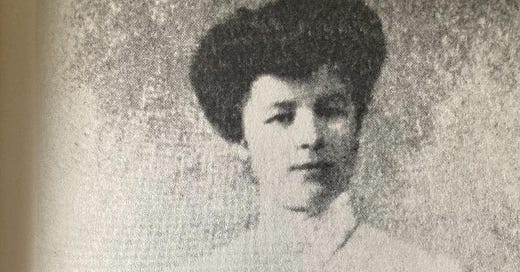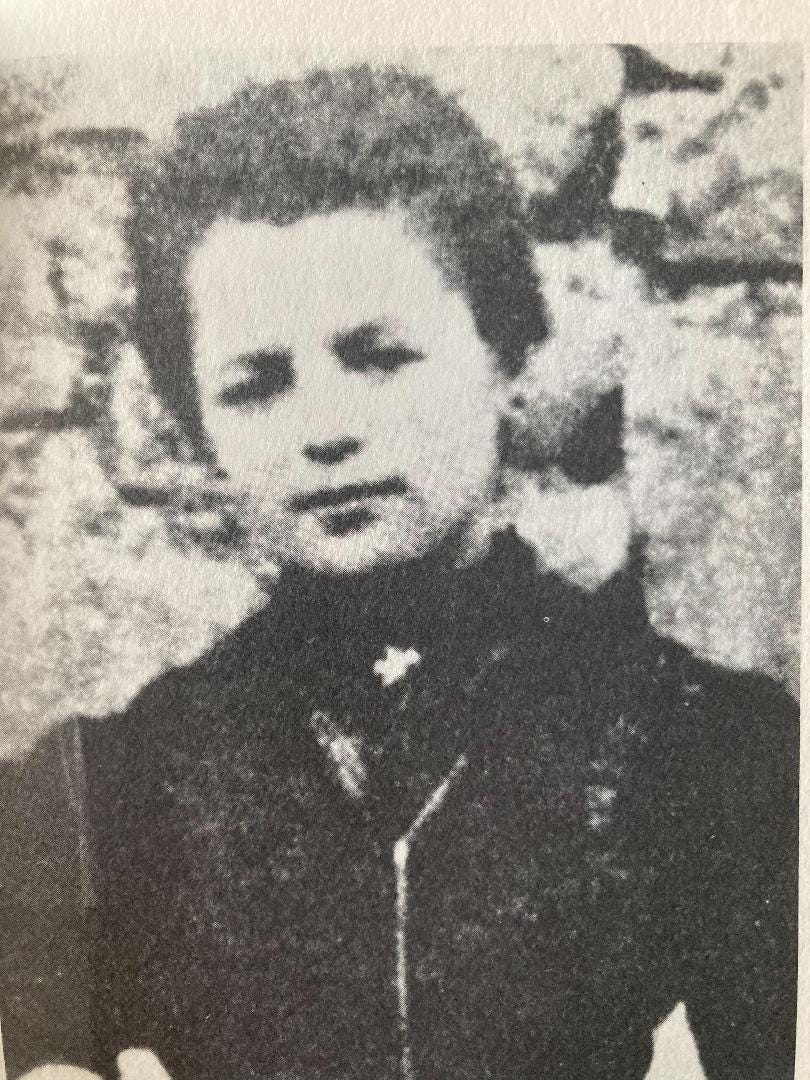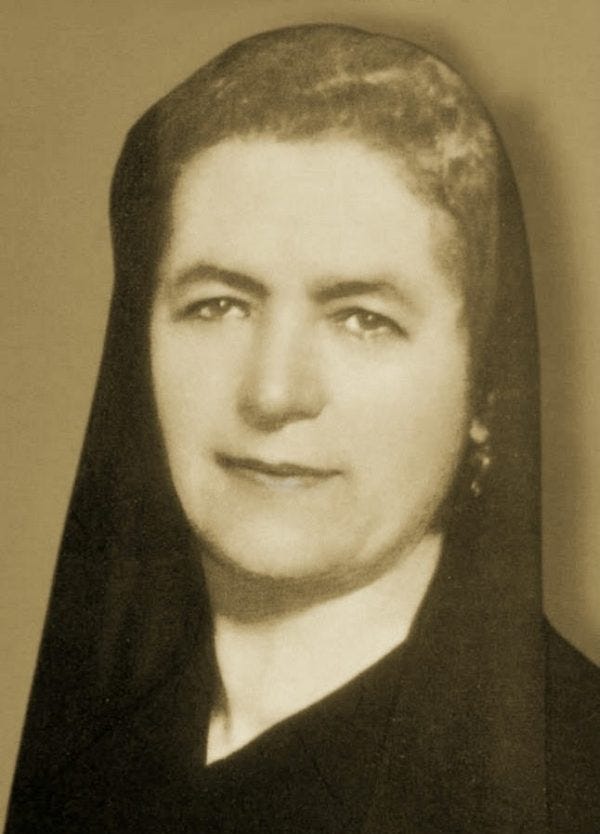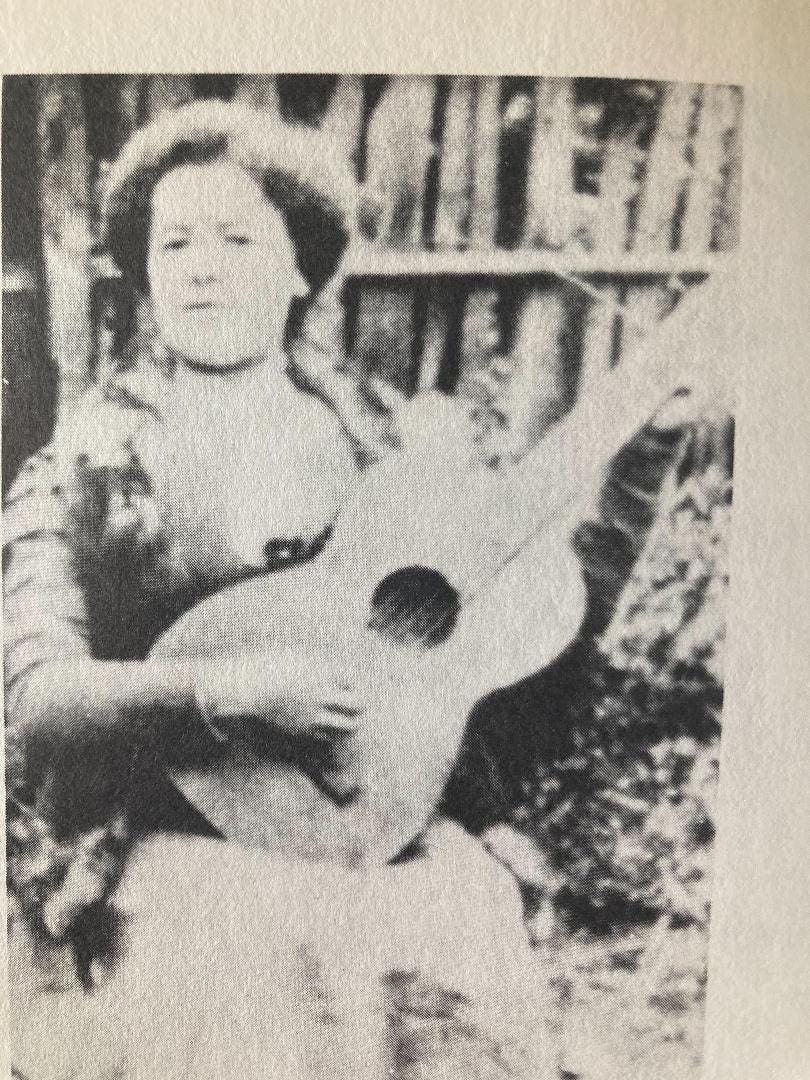Venerable Praxedes Fernandez
Práxedes Fernandez (1886 - 1936) was a 20th century wife, mother, widow, and Dominican Tertiary from Spain, declared Venerable in 2014.
I originally wrote this as a presentation to my Third Order Dominican chapter.
I find Práxedes to be a particularly good example for mothers and homemakers. Her untiring dedication to her duties as the means of her sanctification, as well as her fortitude and perseverance amidst the most terrible sufferings, is a source of inspiration and certainly worthy of imitation.
EARLY LIFE
Práxedes Fernande (/pracks eh dez/) lived in the valley of Mieres (/mere ez/), in the heart of the coal mining industry of Spain. She was born into a Catholic family in the year 1886. From her parents, she had an ideal example of marriage. Praxedes herself was very faithful and pious, even from childhood. She had a very generous heart for the poor and the sick which she maintained for her whole life. When she was 12-years-old, the Dominican Sisters founded a school in her village, which she attended.
She was pious, prayerful, and charitable; so naturally, she was attracted to the religious life. She wanted very much to go to a convent; however, it was her father's wish for her to marry. Her father called her “a precious jewel” and he wanted to ensure that she was taken care of for the rest of her life. Although Praxades desired to join the religious life, she obeyed her father in the choice of her vocation.
Praxedes was careful about her choice of a future husband. She went through many suitors whom she declined. Despite being picky and careful, her family was not satisfied with the man she eventually chose. He was an Asturian miner named Gabriel, and his social status was much lower than that of her own family. Through a lot of hard work, Praxedes' family had become quite wealthy, but now she was marrying a simple laborer who could barely provide enough to eat. This was a loss of social standing for Praxedes which would affect her future drastically.
It turned out that her husband, Gabriel, had a terrible temper, and he was prone to anger and violence. Yet, Praxedes overlooked this vice and loved him very much despite it. She was 28 years old when they entered into the Sacrament of Holy Matrimony together.
MARRIED LIFE
As a new wife, Praxades never wavered in her resolve to fulfill her duties at home and to her husband, according to the married state that she had entered. She knew that her sanctification would be found in her attentiveness to these daily duties of her vocation; she saw God's will in all the situations of her life, even the most ordinary, and she joyfully clung to this as her path to holiness. She was determined to carry all the crosses of her life with fortitude, perfectly resigned to God's will.
She lovingly and diligently attended to her home, took care of her husband, cared for her children, yet never neglected her religious practices. The married state did not distract or diminish her from tending to her spiritual life or maintaining her pious devotions.
For example, Praxades sewed all the clothes for her family, so she was often occupied with sewing and could be seen sewing and ironing on the front porch by all the neighbors. Her cousin once remarked, "I always had the impression that Praxedes was interiorly praying as she sewed." And her sister said, “when we used to sew together, she hardly spoke, and it was easy to see that she was completely recollected interiorly with God.” Praxades knew that she need not be in a convent to pray, meditate, or maintain a close union with God, but that she could pray interiorly always, even if she was occupied with household duties.
According to neighbors, friends, and relations, Praxedes only left her home for necessities. A neighbor said of her, "Do you see that woman? She leaves her home only to go to church and get water from the spigot. She never wastes time visiting or talking to anyone." Her duty to her married state was everything to her. Her duty was at home, therefore her sanctification was at home, and so that’s where she poured out her time, energy and love. She didn’t allow worldly frivolities to distract her.
Many people testified that Praxedes seemed to always be recollected, even in the midst of whatever she was doing - everywhere and in all circumstances, she gave the impression that she was living in the "cell of her heart," like St. Catherine of Siena, yet never neglecting her household duties.
TRAGEDY STRIKES
Despite his bad temper and explosive episodes of anger, Praxedes and Gabriel did have a relatively happy marriage. But their happiness was not destined to last, as tragedy would soon strike.
After just six years of marriage, Gabriel was tragically killed in a train accident. Praxedes was suddenly a destitute widow with four young boys and no money to speak of. Her oldest son was five, and her youngest had been born just two weeks before the accident. When Gabriel was killed, Praxedes was still on bedrest from giving birth.
After a visit to give her sympathies, a relative said of Praxedes: "I never saw such conformity to God's will as hers! What patience! I have never seen anyone like her." But in the midst of her complete resignation to the will of God, there was one thing that caused her pain and suffering: her husband had died without a priest and had not had time to prepare for his death. She was worried about the state of his soul and his eternal destiny.
After nine years of praying for the repose of her husband’s soul, Praxedes was blessed with an extraordinary sign of assurance. One night when she was in bed, she heard footsteps climbing up the ladder on the side of the house. At first, she thought it was one of her sons, but the sound of the footsteps did not stop. The sound kept going up and up and up endlessly; the ladder being climbed seemed to be going on indefinitely. Suddenly, as though filled with an inner grace of understanding, she realized she was not hearing human footsteps going up a physical ladder. This mysterious ascent lasted 15 minutes, until at last, the echo of the footsteps disappeared into the heavens. Although initially she was filled with fear at this mysterious sound, she soon felt a sense of great peace and joy as an interior grace made it known that it was her husband’s footsteps she had heard, as he climbed out of purgatory and into heaven.
As for her four sons, she said she had no worries, because she had given them over to the Blessed Mother. In the midst of all her sorrow, she said she enjoyed great peace because her whole family was under the protection of the Blessed Mother, and she knew that she would always care for them.
LIFE AS A SERVANT
Now that she was a poor widow, she had no choice but to go and live with her mother and sister, Florentina. (By this time, Praxedes father had died).
Although her mother was kind to her, Florentina was not. Because of her lower social status, Florentina treated Praxedes like a slave in the house. Praxedes became the housekeeper and the cook, thus becoming like a real Cinderella in her mother’s home. She did all the cooking and cleaning for the whole household and waited on her mother and sister as a servant would. Praxedes did not resent this condition of servant, because it made her feel closer to Mary, "the handmaid of the Lord."
And despite all her time-consuming work, she still always found time for her private devotions. Her cousin relates: "She used to get up very early to begin her housework. If we ever invited her to the theater, she excused herself, saying her duties don't allow her the time. She would even counsel me to stay home more so that I could be more attentive to my husband and children."
It was common knowledge among her family and neighbors that she devoted herself admirably to her pious devotions without ever neglecting her daily duties. Florentina, who lived with her during her whole widowhood, says: "Praxedes loved to pray and took plenty of time for that without ever neglecting her duty. She slept very little and was up very early."
Praxedes once advised a cousin: "The time that it takes to assist at Mass, far from being an impediment, serves to help you do [your duties] even better."
She once told her son Enrique, "Ever since I heard a sermon about St. Zita, that she went about her domestic duties thinking of God, I do the same."
Although her duties were a little different now that she was a widow - she was no longer serving her husband, but now serving her mother and sister, and still caring for her four sons - she still devoted herself whole-heartedly to her domestic duties, remaining humble, simple, obedient, and maintaining her inner prayer life, too.
DEEPENING OF FAITH
After some time, Praxedes become acquainted with Bishop Malaga, and it was thanks to him that her love of the Eucharist grew even deeper. Bishop Malaga was known as the "Bishop of the Tabernacle" because he encouraged and inspired his flock to have a deeper love for Jesus hidden in the Tabernacle. During this time in her life, Mass and Communion became indispensable for her: nothing could keep her from going to Mass and receiving the Eucharist, neither snow, rain, nor sickness.
Starting in 1931, she began to assist at three Masses daily. She stated that the first Mass was offered in preparation for Holy Communion; at the second Mass, she received Our Lord in the Eucharist; and in the third Mass, she offered thanksgiving.
Praxedes wished ardently for the salvation of all her family, and, in fact, all of mankind, and she placed all her confidence in prayer, especially in the Holy Sacrifice of the Mass.
During the revolution in Spain, there was a time during which she was unable to receive Holy Communion, and Praxedes said those days without the Eucharist were like days without the sun.
In addition to these three Masses, she would also visit the Blessed Sacrament later in the day. It was the Bishop who opened her eyes to how many people had little or no devotion to the Blessed Sacrament and she desired greatly to make reparation for all the people who were so forgetful of Jesus. Her heart ached at the thought that anyone would receive Jesus in a state of mortal sin.
In 1931, Praxedes experienced another tragic loss, and her response showed her complete resignation to God’s will. She lost one of her sons in the same tragic way that she had lost her husband: a train accident. Upon hearing the news, she began to sob, and cried out, “Yes, in this world I too should suffer, as Christ suffered.” She accepted this suffering the same way she did all the others: with patience and submitting herself to God’s will. When the priest came to give his sympathies, she told him: “My son was not mine but God’s, who was his only owner. He has chosen to take him back. All I have to do is be content with God’s holy will.”
She offered prayers, penances, and above all, Masses for the soul of her son. When another son tried to give her money to buy flowers, she said to him, “Flowers will wilt and die. It is better to use the money for Masses for his soul.” She paid the stipend for 30 Masses. This is around the same time that she began to attend 3 Masses a day, and God granted her an extraordinary gift: during the third Mass, which was being offered for her son, she saw a vision of her son in the arms of the Blessed Virgin, and she had wrapped him in her scapular. After this, Praxadez told her son Gabriel to never take his scapular off because it was the devotion that had saved his brother.
HER LIFE AND GOOD EXAMPLE
Those who saw Praxedes’ devotion and reverence at Mass were inspired to greater piety by her example. (This is very Dominican; the Rule during her lifetime, which she had professed to follow, stated that Tertiaries should be an example to all the faithful by behaving with great reverence in the church).
The Rosary was a mainstay through-out her entire life.
Her charity toward the poor and sick had no limit, and yet she managed to tend to the needs of the sick and poor without ever neglecting her duties at home.
She was not only generous in her prayers, but also practiced extraordinary penances.
This is how Praxedes lived her life: always with prayer, penance, untiring work, giving material and spiritual help to the poor, sick, and dying, and a great concern for her sons' futures.
Praxedes saw herself as a servant to all - to her own family, to the poor, and to the sick.
DOMINICAN VOCATION
Although Praxedes was to become a Lay Dominican, she first wanted to be a Carmelite. St. Teresa of Avila was her favorite saint. She read her works, profited from them, and even tried to practice the Carmelite rule as best she could at home
It was in 1934 that her son Enrique became a Dominican novice, on his way to becoming a Dominican priest. More and more, Praxedes felt a closeness to the Dominican order now that her son was a member of it. She told the Dominican sisters that she didn’t feel worthy to be a Dominican, but she did enter the Third Order, taking the name Catalina, after St. Catherine of Siena. At this time, one of the Sisters loaned her a copy of St. Catherine’s Dialogues, which really inflamed her love of the Church even more.
PENANCE
Praxedes lived in the immediate vicinity of the Spanish Revolution of 1934, during which time the Church was greatly repressed. There were many laws against the Church that darkened the religious climate in Spain. Churches were burned, the sacred was desecrated, and priests were murdered. Praxedes courageously maintained her faith in the midst of this persecution. She was faithful to the Church in these sad times, prayed without ceasing, and offered up many hard penances for her country. In fact, Praxades practiced austere forms of penance, so much so that her family was worried about her.
After she became a Dominican Tertiary in 1936, the revolution in Spain intensified significantly. There was bloodshed, with many Catholic priests and religious sisters being killed. This was a terrible time, full of suffering. Praxedes lived in the heart of all this violence.
DEATH
Shortly after the revolution, in 1936, Praxedes became sickly. She had dysentery and was vomiting. She tried to continue doing her usual work around the house, but her family insisted that she stay in bed. At one point, she snuck out to attend her three daily Masses, and she stuffed the bed to make it look like she was under the covers.
Over time, her condition worsened and she became gravely ill. Her son noted that she was very bloated and in constant pain. The doctor forbade her to speak, so she asked her family to pray the rosary in her room with her, promising not to pray aloud, but silently along with them. She died with her arms in the form of a cross and her rosary in her hand.
It had been Praxedes wish to be buried in a Carmelite habit, but they were not able to get one, so they buried her in a Franciscan habit, and they placed a Dominican scapular over it. Thus, in her death she was embraced by the two great patriarchs, Dominic and Francis.








Thank you for writing this.
Thank you, Emily.
She reminds me very much of my own dear mother, also a 'domestic saint' and one who truly reached sainthood by her service to her home and family alongside a somewhat difficult husband. I believe it was my father's inability to relate to her (indeed to all of us) in any personal loving way that actually drove her to a life of love, prayer, service and eventually, GREAT LOVE for our Lord.
ps - I'm from an Evangelical Protestant background, not catholic. We still have our saints, too!